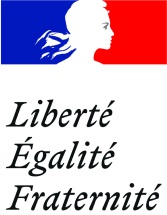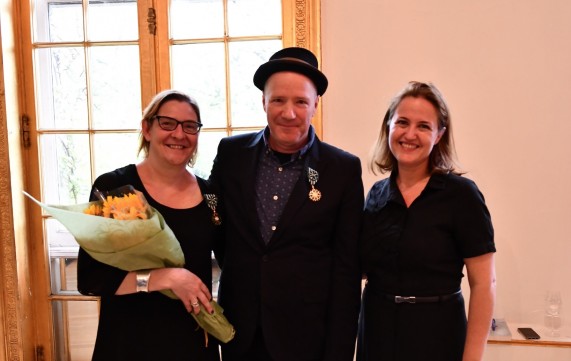On April 26, 2019, Bénédicte de Montlaur, Cultural Counselor of the French Embassy, awarded Emmanuelle Ertel and Rick Moody with the insignia of Officier of Arts and Letters in a ceremony held at the Cultural Services of the French Embassy in New York.
Good evening,
I am Bénédicte de Montlaur, Cultural Counselor of the French Embassy, and it is my great pleasure to welcome you all to the beautiful Payne Whitney Mansion here in New York to honor two friends of the Cultural Services, Emmanuelle Ertel and Rick Moody.
The Order of Arts and Letters was established in 1957 by the French government to recognize renowned artists and writers, as well as other exceptional individuals who have distinguished themselves by their deep commitment to the arts, and to French culture, in particular.
Tonight, we welcome two individuals who have dedicated their lives to literature and transcultural exchange. Emmanuelle, Rick, you are extraordinary representatives of a longstanding French-American literary connection: As translator and writer, respectively, you have each made important contributions to literature in complementary ways on both sides of the Atlantic, enriching the shared culture of our two countries. Some of these contributions are common to you both, since Emmanuelle, you have translated Rick’s work into French. For your singular and collective literary achievements, it is our great pleasure to honor you both this evening.
Let us begin with you, Emmanuelle.
Dear Emmanuelle Ertel,
You once said, “There is not only one French language, and there is not only one way of writing in French.” Translating is both an artistic gesture and a political statement, and this guideline is one of the secrets behind your masterful translations. Your deep understanding of what is at stake when translating a language has been forged throughout your personal and professional life.
The art of translation is the meticulous and Herculean task of transposing one way of understanding the world into another, requiring thoroughness and courage – two qualities that define you. In a panel discussion on “Translating America” at the 2011 PEN World Voices Festival, you said that the first translated book you read was The Little Prince, a book that holds a special place in the hearts of many French readers. You did not read the English translation because you did not have a French copy available, but because this text that you loved and knew in French could also guide you in apprehending and reading the English language. The Little Prince is one of the most translated works ever published, and for you, it was also a door to the beauty of translation, and the pleasure of seeing a text that you enjoy brought to foreign audiences.
In your career as a translator, you have worked on texts by acclaimed contemporary American authors, including Rick Moody, with whom you share a common passion for French literature. You brought his challenging memoir The Black Veil to French-speaking readers, as well as his fascinating contributions to the Assises internationales du roman, on his analysis of Antonin Artaud’s influence.
Your first translation, Louis Begley’s The Man Who Was Late, was published in 1994. You then translated another novel by Begley, As Max Saw It, as well as Tom Perrotta’s Little Children and The Leftovers. Your latest published work was the massive and critically acclaimed translation of A Little Life by Hanya Yanagihara.
Your path began in Paris where you studied literature and received your Bachelor’s degree in English and French literature from the Université Paris 7. After receiving your degree, you interned at The New Press, before joining the Éditions Julliard and then the Éditions Rivages. There, you were involved in selecting foreign novels while supervising French manuscripts. You then returned to academia for your Ph.D. and began teaching at Paris 7 and Paris 8 before crossing the Atlantic in 2006. You are now a Clinical Associate Professor in the Department of French at New York University and a representative for the French Department at the Faculty Assembly there.
In the words of one of your colleagues, and a dear friend, your tremendous love of reading is only equaled by your generosity, your excellence as a teacher, and your work ethic. Indeed, throughout your career, you have been driven by an impulse to share and transmit – an impulse not only expressed in your work as a translator but also in your activities as a teacher. Your classes include 18th-century French Literature, Creative Writing in French, and translation workshops. Your dedication can be seen in your involvement inside as well as outside the classroom: for instance, you created, from the ground up, an M.A. program in literary translation at NYU. There, you also initiated many events dedicated to the study of translation and French literature, including a discussion on “Translating Perec,” a conference entitled “Writing/Publishing/Translating Caribbean Literature,” and another on “Contemporary French Poetry in the U.S.” You have, hosted and moderated numerous events dedicated to translation and French-speaking literature at the Maison Française and NYU. You always ensure that the texture and diversity of the French language is represented and appreciated.
Your work has been distinguished and supported by many grants, including a Campus France Grant towards the establishment of an academic partnership between NYU and the Université Paris 3-Sorbonne Nouvelle, and a Centre national du livre (CNL) grant to support the publication of one of your translations. You have also been a Jury Member for the French American Foundation Translation Prize, and since 2010, you have been a member of the PEN Translation Committee.
At the French Cultural Services, we have been very fortunate to have had the opportunity to work with you: Since 2007, you have been a jury member for our French Voices program which is dedicated to the support of translators and publishers who bring French-speaking authors to American readers, and your participation has been a true asset for the committee.
Emmanuelle, in your career as a translator and a professor, you have displayed a unique dedication to French literature and the French language. Your skills in the art of translation have brought English literature to French-speaking audiences, and your willingness to promote French literature has helped its development here in the US. You are generous, rigorous, and passionate. For all of your contributions, we are truly honored to present you with the Ordre des Arts et des Lettres.
Emmanuelle Ertel, au nom du gouvernement français, je vous fais Officier dans l’Ordre des Arts et des Lettres.
Dear Rick Moody,
You have been hailed by critics as one of the best writers of your generation. You have also told us that, as a writer, you consider France “your home away from home”, and, I have to admit, this confession makes us very proud.
A prolific author with an independent spirit and a distinct taste for experimentation, you are known for your sharp and searing observations of American suburbia, insights which have captivated American and foreign readers alike. You published your first novel, Garden State in 1992, which was awarded a Pushcart Press Editor’s Book Award. However, it was your second novel, The Ice Storm, published in 1994 in twenty countries, which propelled you to the center of the literary scene. This funny and acerbic chronicle of the dissolution of two suburban families was hailed by both critics and readers. It was then adapted into a movie directed by Ang Lee, and starring Kevin Kline, Joan Allen, and Sigourney Weaver, and was awarded the title of Best Screenplay at the Cannes Film Festival in 1997. The same year, you published another highly-praised novel, Purple America, mirroring the decadence of American values. Your following publications, among them Demonology, The Black Veil, and The Four Fingers of Death, were also praised by literary critics. And, not surprisingly, your work has received many prestigious distinctions, including a Guggenheim Fellowship, a NAMI/Ken Book Award, and a PEN Martha Albrand Prize. We are looking forward to the forthcoming second volume of your memoir, The Long Accomplishment, which should be published this summer.
Throughout your career as a writer, you have experimented with various literary forms. In an interview, you identified your own style as “unclassifiable.” You have pushed fiction in every direction, and you never refuse a challenge, be it to write a short story only through hotel reviews left by your main character as you did in Hotels of North America, or a Twitter-style short story in groups of 140 characters as you did in Some Contemporary Characters. In that sense, one might say that you are an heir of the French Oulipo tradition, showing that there is no limit to what literature can do. I might add that you are also a musician and composer, and you are part of a group called the “Wingdale Community Signers”.
Your experimental impulse and creative problem-solving is not limited to your own writing: in an interview, you described how you used the predictive writing feature of our phones to help students override their fear of writing. You are a self-declared life-coach offering help to whomever needs it, answering the emails you receive, and whenever given the occasion, you will enthusiastically work and exchange with others.
This afternoon I had the wonderful opportunity to speak with you in depth about your commitment to French literature and culture for the French Embassy’s upcoming podcast series “The Thing About France” which will launch next week. In addition to your love of Roland Barthes which you will share with us later this evening during a talk at our bookstore, Albertine, you regularly travel to France for literary festivals and events. You have participated in the Festival America in Vincennes, a major celebration of American literature in France. You have also attended the Assises internationales du roman, gathering writers to shed original light on literary questions. In fact, you participated in the very first edition of this major French literary rendez-vous. You jumped on the opportunity to return for another edition and met with French high school students and work with them.
You promote cultural exchange and French literature wherever you are. Here in the US, you regularly collaborate with academic departments of French and creative writing, and never fail to support translated literature at Brown University where you are the Bonderman Professor of the Practice of the Literary Arts. In 2011, you were invited to the NYU Festival of New French Writing establishing a dialogue between leading contemporary writers from both sides of the Atlantic. The embassy has also had the great pleasure to work with you as you kindly joined our initiatives to promote French literature in the US. In 2010, you prefaced a French Voices title, Gwenaëlle Aubry’s No One, and for the 2014 French Voices Awards Ceremony, we were proud to have you as Honorary Chair. Your words on that night beautifully described the relationship between France and the US, underlining that the initiative was “a de facto celebration of what binds our two countries together, a tradition of human values, an anti-tyrannical tradition, and a tradition of bravery and courage in the face of what opposes civility and human dignity. […] The French Voices Award stands for that, stands for the tradition of French writing, stands for the Franco-American historic relationship, now more than ever.”
Rick Moody, you are a creative and generous writer, whose love for experimentation enriches the literary world in original and surprising ways. As an author and a teacher, your work has greatly enriched the French American literary dialog at all levels. This evening, we are sincerely honored to present you with the Ordre des Arts et des Lettres.
Rick Moody, au nom du gouvernement français, je vous fais Officier dans l’Ordre des Arts et des Lettres.



